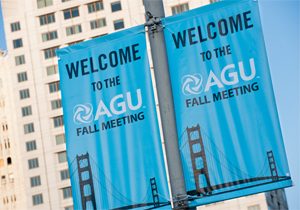By Denis-Didier Rousseau, Fall Meeting Program Chair
Editor’s Note (1 December): AGU is proud to announce that Denis-Didier Rousseau has been chosen to continue his service as the Fall Meeting Program Committee Chair through the 2019 Fall Meeting, when it returns to San Francisco, 9-13 December. During Rousseau’s tenure, he has led efforts to modernize the meeting, including the introduction of new session formats and building more trans- and interdisciplinary connections.
It’s hard to believe that after months of planning, in just a few weeks, we’ll be celebrating AGU’s 49th Annual Fall Meeting in San Francisco. We’ve got an exciting program lined up for attendees.
Since I’ve been appointed as program chair, I’ve tried to push to have more cross-disciplinary sessions and varied formats that foster collaboration and stimulate discussion. We’ve been experimenting with different formats for some time and have now implemented them across the whole program. In addition to traditional sessions, the program offers panel discussions, poster lightning sessions, offered in addition to traditional posters with a quick 3-6 minute presentation near the poster hall, and “pods” which are an opportunity for organized follow-up discussions between attendees and presenters. Pods are a new way for attendees to converse outside of scientific sessions and offer a monitor to display ePosters or presentations. Attendees can reserve the space before the meeting anticipating carry-over conversation, or come to see if a pod is open during the meeting for a more impromptu discussion. AGU’s Fall Meeting is alive and as we say in biological terms—it’s constantly evolving. We wanted to keep up with that evolution and I hope the changes we’ve made reflect that.
Our Sections and Focus Groups work so hard to develop interesting and stimulating programs and I believe calling out just a few scientific sessions would be biased. I hope you’ll visit the Scientific Program to find what interests you most. That said, I would like to highlight a few Union-level programs:
- Presidential Forum –Attendees will hear from H.S.H. Prince Albert II of Monaco. His Prince Albert II of Monaco Foundation focuses on three main challenges: fighting against climate change and promoting renewable energy; combating the loss of biodiversity; and preserving water resources.
- Frontiers of Geophysics Lecture: Shifting the Energy Mix in a Post-Paris World – The panel, moderated by Andrew Revkin, Dot Earth, Pace Academy for Applied Environmental Studies at Pace University, will share economic, scientific, and industry perspectives about energy demand and its driving forces in a post Paris COP21 world.
- The Path Forward from Paris, One Year Later – Hosted by AGU President Margaret Leinen, this panel of high level science policy experts will address outcomes of COP21/CMP11 and implications for the research, policy, and action agendas at all levels.
- Union Agency Lecture: Convergence in the Geosciences – Attendees will hear from Marcia McNutt, 22nd President of the National Academy of the Sciences. McNutt is former editor-in-chief of Science journals and former director of the U.S. Geological Survey (2009-2013), during which time USGS responded to major disasters, including the Deepwater Horizon oil spill.
- New Generation of Scientists – This Union session was created in 2014 and is dedicated to early career scientists and Ph.D. students, an area in which AGU is working hard to foster emerging scientific talent. The 2016 AGU James B. Macelwane Medalists, the Science for Solutions Award recipient and the Africa Awards for Research Excellence in Earth and Space Science will share their ideas on the future of their respective fields.
All the Union sessions and special lectures are available for free both live-streamed and on demand through AGU On-Demand, which we’ve expanded. On-Demand and SWIRL topics have been merged this year and I hope you’ll find a wealth of interesting cross-disciplinary sessions to choose from. I’m excited to have two new topic areas on the list: Geohealth, a new channel this year which ties into the launch of AGU’s newest journal and reflects the focus and leadership we’re taking in this new area of research, and Data and Emerging Technologies, an important area of opportunity for Earth and space sciences. Scientists gather large amounts of data that are not well organized or well managed across our community. In many countries, this is a relatively new concern and as a principal investigator in my own country, France, I know we’re not managing data well. I see this as a great area of opportunity for AGU to lead positive change.
We’re always looking for ways to improve the meeting experience and I hope you enjoy all that this year’s meeting has to offer. It’s been a sincere honor to serve as Fall Meeting Chair for the past three years and I look forward to meeting you once more in San Francisco. Safe travels!

Please provide the dates, times, and locations of the five Union-level programs described in your message. Thank you.
11 December Public Lecture: Michael Meyer, Bethany Ehlmann, Alex Longo
12:00 – 1:00pm: Moscone South, Room 104
How Do We Choose a Landing Site on Mars?
12 December Presidential Forum: H.S.H. Prince Albert II of Monaco
12:30 – 1:15pm: Moscone North, Hall E
13 December Frontiers of Geophysics Lecture: Marilyn Brown, Howard Gruenspecht, Veerabhadran Ramanathan
12:30 – 1:30pm: Moscone North, Hall E
Shifting the Energy Mix in a Post-Paris World Panel Discussion – Moderated by Andrew Revkin, Dot Earth, Pace Academy for Applied Environmental Studies at Pace University
15 December Union Agency Lecture: Marcia McNutt
12:30 – 1:30pm: Moscone North, Hall E
15 December New Generation of Scientists
1:40 – 6:00pm: Moscone South – 102